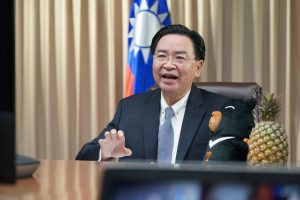Fans of “freedom fries” and Australian “freedom wine,” rejoice: There’s a new addition to the table.
The United States and Canada are among the countries praising Taiwan’s “freedom pineapples” after China last week blocked imports of the fruits, a decision widely seen in Taipei as a political move meant to economically pressure the country.
Beijing stopped all Taiwanese pineapple imports on March 1 for biosecurity reasons, saying the fruits could carry “harmful creatures.”
Taiwanese officials aren’t buying it. Minister of Economic Affairs Wang Mei-hua told CNBC on Thursday the pineapple ban “does not comply with international trade rules,” and officials in the ruling Democratic Progressive Party (DPP) consider it an economic pressure tactic.
The vast majority of Taiwanese pineapples are consumed domestically, but of those that are exported, more than 90 percent were sold to China last year.
President Tsai Ing-wen last week called the ban “an ambush-like notice” that “obviously was not a normal trade decision.”
Tsai also called on Taiwanese to support farmers by buying and eating domestic pineapples. Taiwanese people have heeded her call: Earlier this week, Premier Su Tseng-Chang said domestic pineapple demand has exceeded this year’s total projected exports to China.
Taiwanese companies have increased production of pineapple products, such as pineapple beer, and local politicians are frantically publicizing their visits to the country’s pineapple farms.
Taiwan Foreign Minister Joseph Wu used the opportunity to call for international solidarity, taking to Twitter to ask the world to “rally behind the #FreedomPineapple.”
In response, the American Institute in Taiwan, the de facto U.S. embassy in the country, posted pictures of Taiwanese pineapples on Facebook, including a photo of its director Brent Christensen with three pineapples on his desk, using the hashtags #realfriendsrealprogress and #pineapplesolidarity.
The Canadian Trade Office in Taipei – that country’s de facto embassy – used the hashtag #FreedomPineapple on its Facebook page along with a photo of staff posing around a pineapple pizza. “We in the Canadian Office like pineapple pizza, especially pineapples from Taiwan!” it wrote.
It’s the second time in recent months Taiwanese officials have taken to social media to protest Chinese trade restrictions. In December, Taiwanese politicians promoted Australian “freedom wine” after China raised taxes on Australia products.
The foreign support for Taiwanese pineapples came along with a bill introduced in the U.S. House of Representatives that called for the United States resume diplomatic ties with Taiwan and negotiate a free trade agreement with the island.
The non-binding resolution, introduced by House Republicans Tom Tiffany and Scott Perry, has been panned by analysts who see it as a political stunt that misinterprets the existing U.S. “one China policy,” along with basic facts about Taiwan’s history.
Beijing often conflates its own one China principle – that there is one China and the Chinese Communist Party (CCP) is the legitimate government of that China – with foreign policies, such as the stance of the United States. However, the U.S. has never and does not assert that the CCP maintains sovereignty over Taiwan.
The bill also said the February 28 massacre of 1947 “triggered Taiwan’s democratic transformation.” The massacre actually led to 38 years of martial law in Taiwan and tens of thousands of deaths.
Brookings scholar Sheena Grietens told Newsweek the bill’s authors likely intended to refer to the Kaohsiung Incident of 1979, which eventually led to the formation of an opposition party and the dissolution of Taiwan’s martial law rule.

































